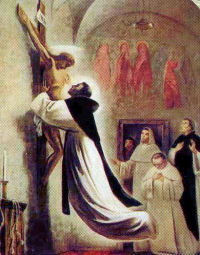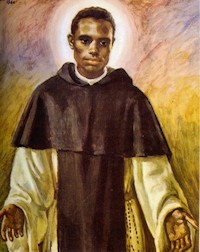Ordinary Time: November 3rd
Thursday of the Thirty-First Week in Ordinary Time; Optional Memorial of St. Martin de Porres, Religious
Other Titles: Martin of Charity; the Saint of the Broom
» Enjoy our Liturgical Seasons series of e-books!
Today the Church celebrates the Optional Memorial of St. Martin de Porres, religious (1579-1639), who lived a life of fasting, prayer and penance as a Dominican lay brother. He was born in Peru of a Spanish knight and a Negro woman from Panama. Martin inherited the features and dark complexion of his mother, and for that reason his noble father eventually turned the boy out of his house. After a turn as a surgeon's apprentice, the young man joined the Dominicans as a laybrother and was put in charge of the infirmary of a friary in Lima. Soon he was caring for the sick of the city and the slaves brought to Peru from Africa—not to mention the animals with which he is often pictured. Martin had the gift of miracles; and although he had no formal training, he was often consulted on theological questions by great churchmen of his day. St. Rose of Lima and St. Juan Macias were among his close friends. He is unofficially called the patron of social justice.
Remember to pray for the Poor Souls in Purgatory from November 1 through the 8th.
St. Martin de Porres
St. Martin de Porres was born at Lima, Peru, in 1579. He was the illegitimate son of a Spanish gentleman. His mother was a freed-slave from Panama, maybe black but also possibly of Indian blood. At fifteen, he became a laybrother at the Dominican Friary at Lima and spent his whole life there — as a barber, farm-laborer, almoner, and infirmarian, among other things.
 Martin had a great desire to go off to some foreign mission and thus earn the palm of martyrdom. However, since this was not possible, he made a martyr out of his body, devoting himself to ceaseless and severe penances. In turn, God endowed him with many graces and wondrous gifts, such as aerial flights and bilocation.
Martin had a great desire to go off to some foreign mission and thus earn the palm of martyrdom. However, since this was not possible, he made a martyr out of his body, devoting himself to ceaseless and severe penances. In turn, God endowed him with many graces and wondrous gifts, such as aerial flights and bilocation.
St. Martin's love was all-embracing, shown equally to humans and animals, including vermin, and he maintained a cats' and dogs' hospital at his sister's house. He also possessed spiritual wisdom, demonstrated in his solving his sister's marriage problems, raising a dowry for his niece inside of three days' time, and resolving theological problems for the learned of his Order and for Bishops. A close friend of St. Rose of Lima, this saintly man died on November 3, 1639 and was canonized on May 6, 1962.
—Taken in part from Lives of the Saints, Rev. Hugo Hoever, S.O.Cist., Ph.D., Catholic Book Publishing Company
Patronage: African-Americans; against rats; barbers; bi-racial people; hair stylists; hairdressers; hotel-keepers; innkeepers; inter-racial justice; mixed-race people; mulattoes; paupers; Peru; poor people; public education; public health; public schools; race relations; racial harmony; social justice; state schools; television.
Highlights and Things to Do:
- Volunteer at a local soup kitchen or do some other act of service for the poor, following the example of St. Martin.
- Say a Hail Mary for those sold into slavery in the Sudan where tens of thousands of children and adults have been snatched from their homes, or anywhere in the world where slavery is practiced.
- Books for Children:
- Pied Piper of Peru by Anne Tompert
- Saint Martin de Porres and the Mice by Eva K. Betz
- Saint Martin de Porres by Lawrence Lovasik
- Saint Martin de Porres by Mary Fabyan Windeatt
- Saint Martin de Porres: Humble Healer by Elizabeth Marie DeDomenico
- A Story of Saint Martin De Porres by Brother Ernest C.S.C.
- About St. Martin
- 7 fascinating facts about St. Martin de Porres
- Dominicans reflect on 50-year legacy of St. Martin de Porres' sainthood
- St. Martin de Porres, first black saint of the Americas, celebrated Nov. 3
- Apparently St. Martin de Porres only had two teeth when he died
- Man recounts miraculous healing through St. Martin de Porres' intercession
Visiting a Cemetery: An indulgence, applicable only to the Souls in Purgatory, is granted to the faithful, who devoutly visit a cemetery and pray, even if only mentally, for the departed. The indulgence is plenary each day from November 1-8; on other days of the year it is a partial indulgence.
Visiting a Church on November 2: A plenary indulgence, applicable only to the souls in purgatory, is granted to the faithful who, on All Souls' Day (or, according to the judgment of the ordinary, on the Sunday preceding or following it, or on the solemnity of All Saints), devoutly visit a church or an oratory and recite an Our Father and the Creed.
Praying for the Faithful Departed: A partial indulgence, applicable only to the souls in purgatory, is granted to the faithful who,
- devoutly visit a cemetery and at least mentally pray for the dead;
- devoutly recite lauds or vespers from the Office of the Dead or the prayer Eternal rest. (Manual of Indulgences, fourth edition, 1999)
Indulgence Requirements:
- To gain a plenary indulgence, in addition to excluding all attachment to sin, even venial sin, it is necessary to perform the indulgent work and fulfill the following three conditions: sacramental Confession, Eucharistic Communion, and prayer for the intention of the Sovereign Pontiff.
- A single sacramental confession suffices for gaining several plenary indulgences, but Holy Communion must be received and prayer for the intention of the Holy Father must be recited for the gaining of each plenary indulgence.
- The three conditions may be fulfilled several days before or after the performance of the prescribed work; it is, however, fitting that Communion be received and the prayer for the intention of the Holy Father be said on the same day the work is performed.
- The condition of praying for the intention of the Holy Father is fully satisfied by reciting one Our Father and one Hail Mary. A plenary indulgence can be acquired only once in the course of the day, a partial indulgence can be acquired multiple times.
- If a visit to a Church or an oratory is required to obtain an indulgence attached to a particular day, this may be accomplished from noon of the preceding day until midnight of the particular day.
Manual of Indulgences, fourth edition, 1999 (Enchridion Indulgentarium)







